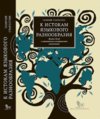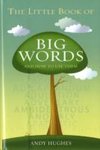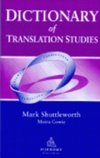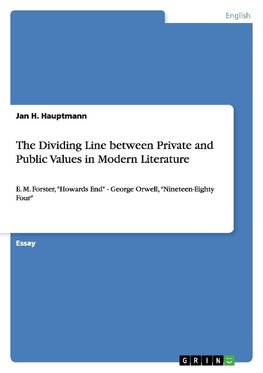
-
 Anglický jazyk
Anglický jazyk
The Dividing Line between Private and Public Values in Modern Literature
Autor: Jan H. Hauptmann
Essay from the year 2007 in the subject English Language and Literature Studies - Literature, grade: 1,3, Queen's University Belfast (School of English), course: Literature and the Politics of Modernity, 11 entries in the bibliography, language: English,... Viac o knihe
Na objednávku
14.76 €
bežná cena: 16.40 €
O knihe
Essay from the year 2007 in the subject English Language and Literature Studies - Literature, grade: 1,3, Queen's University Belfast (School of English), course: Literature and the Politics of Modernity, 11 entries in the bibliography, language: English, abstract: This essay focuses on two modern literary works by E.M. FORSTER and George
ORWELL. While FORSTER's fourth published novel Howards End was already
written in the early twentieth century (1910), ORWELL's famous dystopia
Nineteen Eighty-Four was only published in 1949 and may therefore be
considered as a late modern work.
The historical background of the two novels obviously differs to a great
extent. On the edge of the First World War, E.M. FORSTER was particularly
concerned with a disrupted society under the direct influence of the significant
changes in modern social life. The increasing forces of imperialism and
capitalism and tendencies of a growing urbanisation largely changed the lives of
people, directly affecting their private and public spheres. When ORWELL wrote
his novel under the influence of the Second World War, modern life had
additionally been shaken up by two world wars and the effects of totalitarian
systems in Europe.
Despite the historical gulf between Orwell and Forster, which makes a
direct comparison of their works impossible, this paper will concentrate on the
private and public values of the novels' characters and thus also pay attention
to probable political notions of the authors. It will particularly figure out if the two
writers either endorse or contest a dividing line between private and public
values, additionally taking into consideration formal features as well as the
overall plot.
Forster's novel Howards End predominantly deals with the interrelations
of two middle class families called the Schlegels and the Wilcoxes. Despite
belonging to the same class, their actual social background differs to a great
extent. Margaret and Helen Schlegel are initially depicted as not being English
"to the backbone", which is not only true because of their German origins, but
also because of their idealist attitude they seem to have adopted from their
father, who rather was "the countryman of Hegel and Kant, [...] the idealist,
inclined to be dreamy, whose Imperialism was the Imperialism of the air".
Idealism and anti-imperialism are obviously not to be considered as being very
English any more, but rather seem to have died out all over modern Europe.
- Vydavateľstvo: GRIN Verlag
- Rok vydania: 2008
- Formát: Paperback
- Rozmer: 210 x 148 mm
- Jazyk: Anglický jazyk
- ISBN: 9783640215218
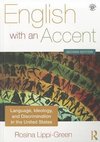


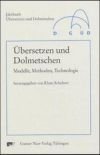
 Nemecký jazyk
Nemecký jazyk 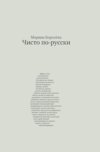
 Ruský jazyk
Ruský jazyk 

